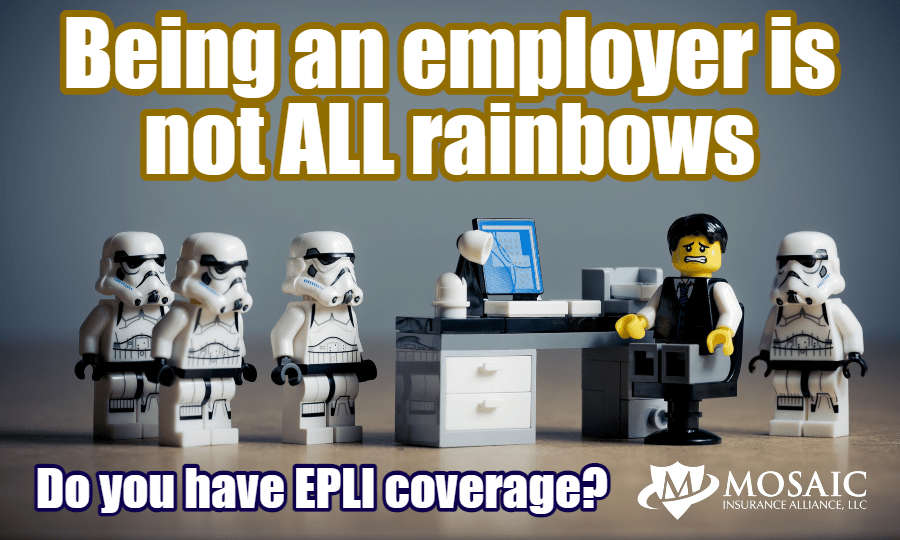Did you know that small/new businesses are the ones that are the most vulnerable to employment lawsuits? All kinds of employers with all kinds of sized businesses are sued by employees every day. It is fact that you cannot please everyone all the time. It is also a fact that as an owner, you are responsible for your actions and those of your employees.
If you own your own business, getting EPLI is in the best interest of you, your company, your employees, and those you call clients. As Nationwide says, “Bad things do happen.”
Our due diligence only does so much to prevent harm, and some things are inevitable, like the actions one employee takes towards another. That is why insurance exists—to protect you, your reputation, your assets, and those you interact with so that you can do the business you set out to do.
EPLI means that you will be protected in case a disgruntled employee tries to sue you for…
1. Discrimination by you or other employee(s) that you failed to stop after it was brought to your attention. Some actions/comments that discriminate people are those that judge people on their age, gender, race, religion, and/or disabilities.
2. Wrongful Termination. Some common examples include firing someone because (1) of their race, gender, or religion; (2) they truthfully reported another employee for inappropriate behavior like discrimination or sexual harassment; (3) they had justified unattendance that was communicated with you appropriately; and (4) they become pregnant or need to go on maternity/paternity leave.
3. Harassment by you or by another employee(s) whose actions you were aware of and did not take the necessary actions to make the harassment stop and/or punish the guilty party. Harassment includes actions like making fun of someone’s accent or speech impediment, physical appearance, smell, lack of abilities, etc. Sexual harassment is also one that is commonly heard of in the workplace.
4. Other actions or inactions can also result in an employee suing. This can be something like the inability for an employee to get promoted despite clear efforts.
What steps can you take to avoid harm in the first place?
After you get the EPLI right for you based on potential loss exposures, you can further protect yourself by taking necessary precautions like the ones listed below. Not sure which EPLI is good for your company? Give us a call and we can help you get the coverage you need—425-320-4280
Helpful precautions include:
1. Create an employee handbook: If you detail your company policies and procedures, your employees will be more informed and have a higher chance of acting appropriately. Give details on things like your attendance policy, how someone can go about filing complaints, and the discipline of those who offend. Make sure that you have an “open door” policy and clearly highlight it. You want your employees to know that there is zero-tolerance for discrimination and harassment and that they can come to you if it does occur without fearing retribution. If a problem does arise, have a documentation process in place so that you can keep records of the incident and the actions that you took to resolve.
2. Supply clear job descriptions: Each position needs to have current text that clearly defines the expectation of the employee regarding skills and performance. Avoid pushing “and other duties as they come” over the limits—workers can become frustrated if this is used as an escape goat to overwork them and/or assign them tasks that really do not fall under this clause.
3. Speaking of job descriptions, develop an action plan to weed out job applicants who are not what you are looking for: If you create a hiring program that screens applications based on needed and unwanted criteria—skills, education, personality correlation, etc.—you will have an easier time calling people for interviews. You will also be able to be more successful at avoiding bad fits before hiring. Please note that during your hiring process background checks on possible candidates is a good idea. Also, you’ll want to make sure that job applications do not contain restrictions that could be deemed as discriminatory—certain age range, specific race, etc.
4. Do performance reviews regularly: You team likes to know when they are doing a good job, so make sure that you take the time to highlight each employee’s strengths and accomplishments. Also take this time for constructive criticism so that he/she knows what they need to work on to improve and make your business more successful. Document these talks in each employee file so that you have record of these conversations and so that you can reflect on them if needed.
EPLI information provided by Nationwide Insurance. For current insurance news and tips, follow our blog.

